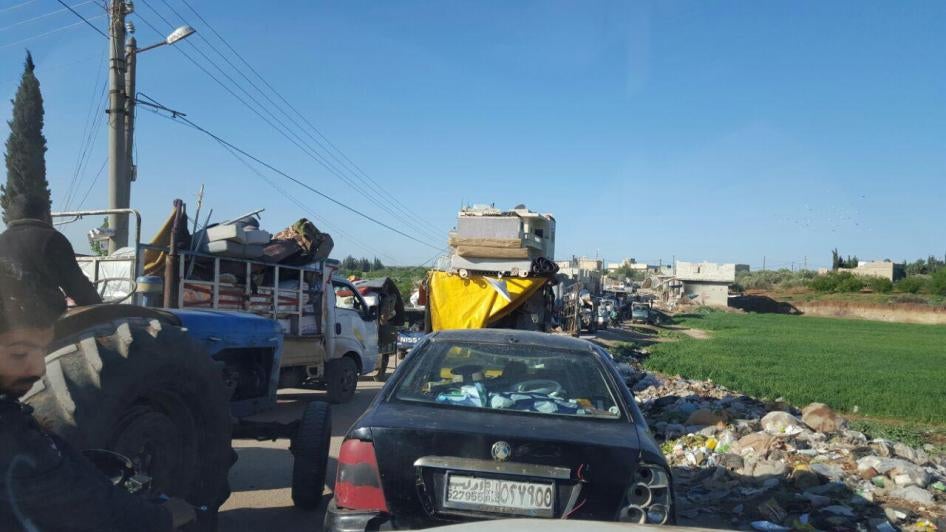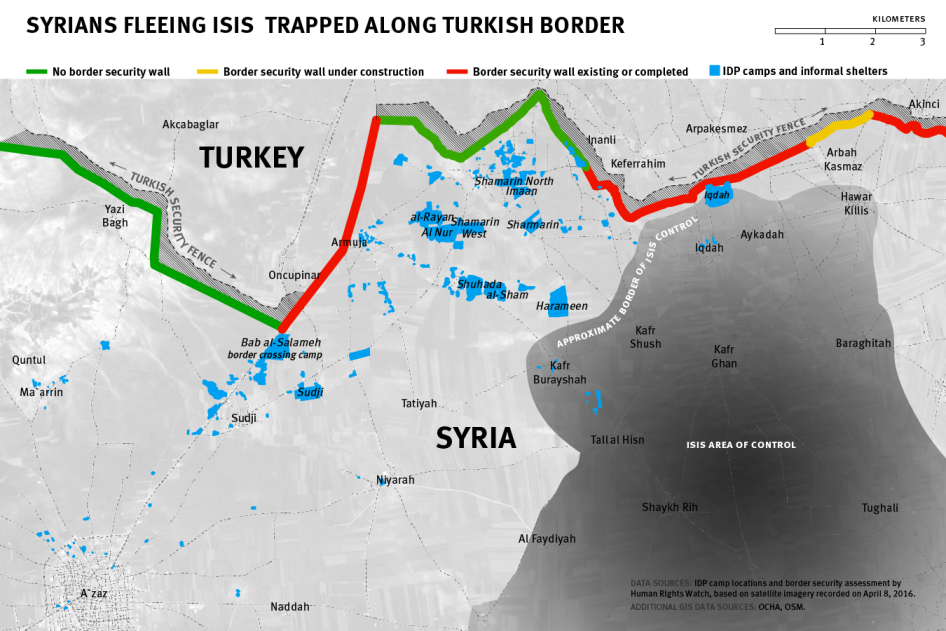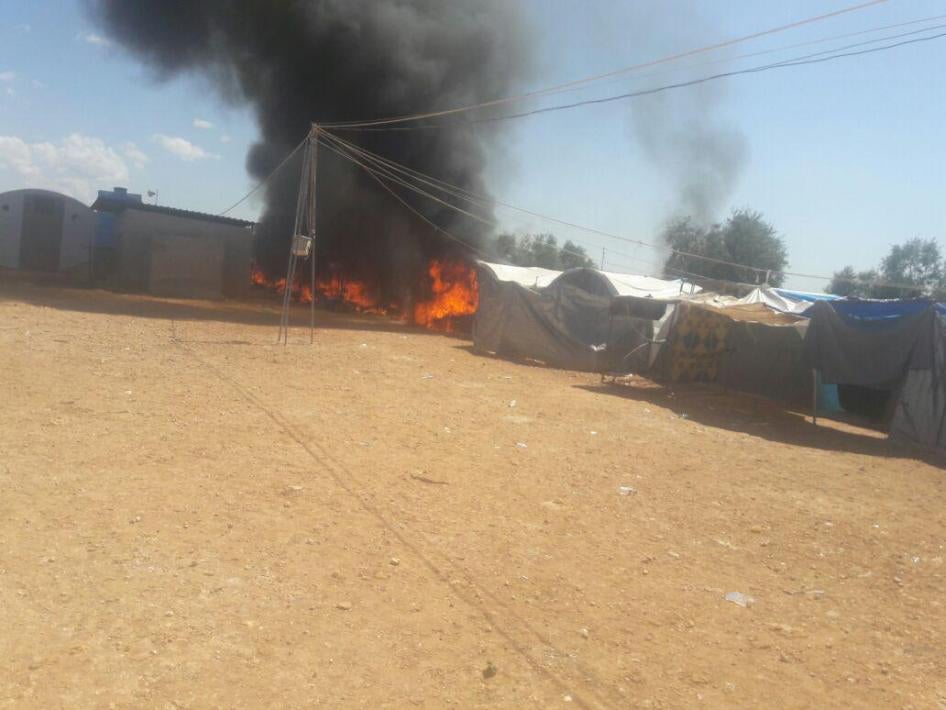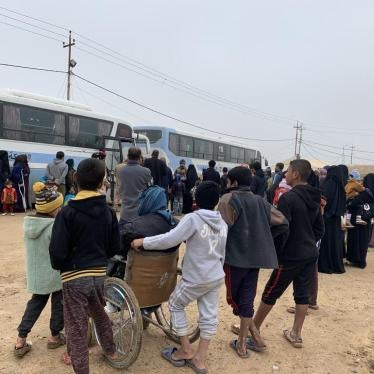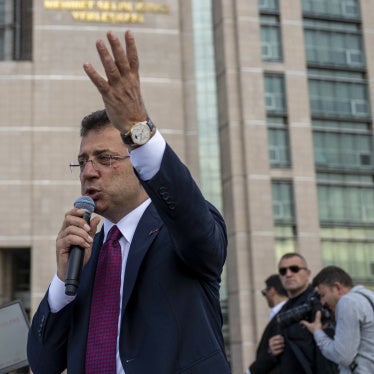(Istanbul) – Turkey should stop shooting at Syrian civilians fleeing fighting and immediately allow them to cross the Turkish border to seek protection, Human Rights Watch said today. Renewed fighting between the Islamic State, also known as ISIS, and armed opposition groups in Northern Aleppo has displaced at least 30,000 people in the past 48 hours, with Turkish border guards shooting at some of them as they approach Turkey’s new border wall.
Turkey’s border remains firmly shut, a year after the authorities started rejecting all but the most seriously injured Syrians. Turkey has previously indicated it wants to create a “safe zone” in Syria to which Syrians could ostensibly flee and Turkey could return Syrian refugees. In its March 8, 2016 deal with Turkey, the European Union said it would work with Turkey to “allow for the local population and refugees to live in areas which will be more safe.”
“As civilians flee ISIS fighters, Turkey is responding with live ammunition instead of compassion,” said Gerry Simpson, senior refugee researcher at Human Rights Watch. “The whole world is talking about fighting ISIS, and yet those most at risk of becoming victims of its horrific abuses are trapped on the wrong side of a concrete wall.”
According to international aid workers in Turkey and heads of six of the 10 displaced persons camps east of Azaz near the Turkish border, ISIS advances on April 13 and 14 have forced out at least half the camps’ 60,000 residents. They have fled to other camps, to the Bab al-Salameh camp on the Turkish border and to the nearby town of Azaz. Three of the camps – Ikdah, Harameen and al-Sham – are now completely empty of the 24,000 people previously sheltering there.
On April 14, Human Rights Watch spoke with the representatives of six of the 10 camps and seven displaced Syrians who had been living in camps that had been taken over by ISIS or that were close to the fast-changing ISIS front line. All of the residents said they wanted to flee to Turkey but that the closed border meant they had nowhere to escape to. Some said they had stayed in the camps under ISIS-threat because they were afraid they wouldn’t be able to find shelter elsewhere, knowing other camps along the Turkish border were completely full. Others said they had returned to their nearby home villages even though they were still unsafe.
The head of Ikdah camp, on the Turkish border, said that ISIS had taken over the camp, which sheltered just under 10,000 people, early on April 14, fired shots in the air, and told residents to leave.
A camp resident who escaped described what happened:
“At dawn we heard gunshots near the camp. A short while later ISIS arrived and used a loudspeaker to tell us we all had to leave. They said we had nothing to fear and that we should all go east, into ISIS territory. We left the camp but headed north through olive groves toward the Turkish border. We were about 2,000 people. As we approached the border wall we saw Turkish soldiers on a hill behind the wall and they just started shooting at us. They shot at our feet and everyone just turned round and ran in all directions. I took my family and we walked to another [displaced persons] camp nearby, called al-Rayan. We’re afraid now because ISIS is close to this camp too. But where can we go.”
The head of al-Sham camp, close to the town of Kafr Bureysha two kilometers south of the Turkish border, said during an interview that the sound of machine gun fire in the background was coming from advancing ISIS pickup trucks from the new front line town of Kafr Shush, about a kilometer away. He said that gunfire had injured a 30-year-old man in the camp earlier in the day and that people in the camp who couldn’t escape quickly enough were digging holes to protect themselves.
On April 14, displaced persons’ representatives on the Syrian side of Turkey’s closed Bab al-Salameh border crossing told Human Rights Watch that about 5,000 displaced people from camps to the east taken by ISIS or under ISIS threat the previous night and earlier that morning had arrived in the Bab al-Salameh camp and the nearby town of Azaz.
“Turkey’s closed border is forcing Syrian men, women, and children to dig ditches and hide to escape the horrors of war,” Simpson said. “Turkey’s attempt at creating a so-called safe zone is a terrible joke for civilians cowering underground and desperate to escape Syria.”
As of early April, Turkey had completed a third of a 911 kilometer rocket-resistant concrete wall along its border with Syria. Satellite imagery dated April 8 reviewed by Human Rights Watch showed that the wall had sealed off significant parts of the border north of Aleppo.
Starting in late March, Syrian armed opposition groups opened an offensive from their enclave in Azaz to retake key areas from ISIS along the Turkish border. After armed groups took the town of al-Rai, ISIS began a counteroffensive on April 9, retaking a number of areas. Clashes in the towns near the Turkish border continue as armed rebel groups and ISIS try to gain control over towns there.
According to reliable United Nations sources in Turkey, as of April 14, ISIS had opened an attack against villages to the east of Azaz, which is near the Turkish border, and was in control of several villages, including Hiwar Kalas, Kafr Shush, Zayzafun-Ekdeh, and Baraghideh.
As of April 12, various agencies had identified 75,000 displaced Syrians living in about 10 informal camps and a number of locations in Azaz, to the east of the town along the Turkish border and in Bab al-Salameh. They also estimated at least an additional 25,000 displaced people were in various locations to the east of Azaz. Many of them have fled multiple rounds of fighting and offensives in Northern Syria.
Since early 2015, Turkey has all but closed its borders to Syrians fleeing the conflict. On April 12 and 13, 2016, Human Rights Watch interviewed eight people who described how Turkish border guards at the Syrian border violently pushed them and dozens of others back to Syria in February and March 2016. Two described how Turkish border guards beat fellow asylum seekers so badly they could not recognize their faces.
These recent accounts of Turkish border guard abuses are consistent with Human Rights Watch findings in late 2015 that Turkish border guards beat and summarily expelled dozens of Syrians who crossed to Turkey using smugglers.
Turkish authorities have allowed international aid groups based in Turkey to cross into Syria and join Syrian aid groups to distribute tents and other assistance to Syrians stuck at the border crossing and in nearby border areas.
Human Rights Watch said that allowing much-needed cross-border aid does not absolve Turkey of its obligation to respect the principle of non-refoulement. That principle, under customary international law and international human rights law, prohibits rejecting asylum seekers at borders when that would expose them to the threat of persecution and torture.
In July 2015, President Recep Tayyip Erdoğan of Turkey said that “cleansing the region of all threatening elements and establishing a safe zone constitutes the basis of 1.7 million Syrian refugees’ return.” The same month, Mevlüt Çavuşoğlu, the foreign minister, said that, “When areas in northern Syria are cleared of the [ISIS] threat, the safe zones will be filled naturally.... People who have been displaced can be placed in those safe areas.”
While Turkey’s desire to limit the number of refugees may be understandable, the current situation in northern Syria makes clear that any “safe zone” would be safe in name only and would put the lives of displaced people in danger, Human Rights Watch said.
In mid-March, the EU concluded a controversial migration deal with Ankara to curb refugee and migration flows to Europe, offering €6 billion in aid to assist Syrians in Turkey, and reinvigorated EU membership negotiations and the prospect of visa-free travel for Turkish citizens. A key objective of the deal is to enable Greece, with EU support, to reject almost all asylum applicants arriving by boat from Turkey on the grounds that Turkey is a safe country. The EU’s explicit pledge to work with Turkey to create in Syria “areas which will be more safe” where “the local population and refugees [will be able] to live” should be seen in the context of a broader plan to contain the flow of asylum seekers.
“The violence at the Turkey-Syria border is terrible proof of what’s wrong with the EU-Turkey deal,” Simpson said. “EU countries and Turkey should be working together to provide genuinely safe havens for Syrian refugees, not slamming doors shut in rapid succession.”
